Jackpot Sounds & Responsible Gambling: Play & Learn
The journey from the first Charles Fey slot machine (USA, late 19th century) to the first online gambling platform from Microgaming (1994) took about a hundred years. It was these two inventions that defined the modern world of gambling. From the very first spin, the principles of responsible gambling ceased to be recommendations — they became a global agenda.
Contents
The iGaming landscape is reeling, and the reason for that is a troubling 2025 trend. More players are convinced they are bulletproof and immune to bankruptcy. Here’s the truth of where that recklessness leads:
- About 20 million Americans are struggling with addiction or are at risk of it.
- 50.2% of all slot players have gambling problems.
- In 2023, players in the United States gambled for over $260 billion.
Responsible online gambling is a story about how to remain the owner of the game, and not a hostage to it. On the Jackpot Sounds platform, we will help you understand these principles and guide you on where to go for support.
What Is Responsible Gaming, Put Simply?
What is responsible gambling, and how do I practice it? Responsible gambling practices and principles are fundamental concepts in iGaming that should be adhered to by all participants. The bottom line is to minimize harm.
In an online casino, it is easy to run into a bankroll emergency. Players may experience obsessive thoughts about gaming, make secret bets, lie to loved ones, and desperately attempt to “recoup” their losses, which often ends in debt and isolation.
The main goal of responsible gambling is to convince the player to treat it as a form of entertainment, not a way to make money. Key principles include maintaining your composure, never betting more than you can afford to lose, and only choosing legal bookmakers or online casinos.
Recognizing Problem Gambling
Identifying the signs of problem gambling is essential in addressing the issue before it escalates. By understanding the behavioral patterns associated with compulsive betting, individuals can intervene early and seek assistance.
Thus, one should consider some key indicators:
# | Signs and aspects | Main manifestations |
|---|---|---|
1. | Behavioral signs |
|
2. | Emotional signs |
|
3. | Financial signs |
|
Self-Assessment Questionnaire
In describing the principles of responsible online gambling, 800gambler.org emphasizes that engaging in a self-assessment can provide valuable insight into one’s gambling habits.
Consider the questions below:
# | Question | Yes | No |
|---|---|---|---|
1 | Do you find yourself preoccupied with thoughts of gambling? | □ | □ |
2 | Have you ever lied to conceal the extent of your gambling activities? | □ | □ |
3 | Do you feel the need to gamble with increasing amounts of money to achieve the same level of excitement? | □ | □ |
4 | Have you experienced distress or difficulty in controlling your gambling habits? | □ | □ |
5 | Do you continue to gamble despite negative consequences, such as financial losses or strained relationships? | □ | □ |
6 | Have you attempted unsuccessfully to cut down or stop gambling? | □ | □ |
7 | Do you experience withdrawal symptoms when unable to gamble, such as restlessness or irritability? | □ | □ |
If you have answered “Yes” to at least three of these questions, you should be careful, as you are likely to be at risk of problem gambling. Read the article carefully to identify all possible ways to mitigate the issue.
Seeking support and assistance is the first step to reclaiming control and well-being.
Trusted Help Centers and Gambling Support Networks
Responsible gambling, meaning a common-sense philosophy, should underpin all wagering activities. Leading organizations and platform operators like GamCare, GamTalk, and GambleAware have created an arsenal of security tools that turn risky entertainment into a controlled hobby.
800-GAMBLER
This is the 24/7 National Gaming Addiction Helpline. Here, you will be advised anonymously; they will apply proven treatment methods to help you return to a normal life.
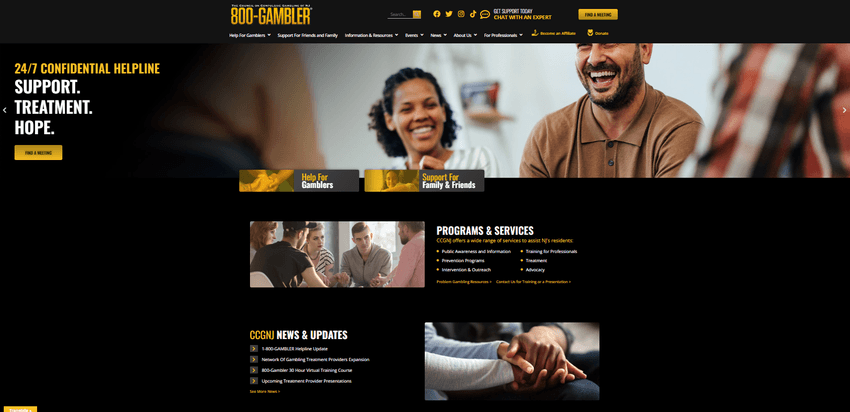
Contacts | Website: https://800gambler.org/ Phone: +1-800-426-2537 SMS: 800GAM |
|---|---|
Main functions | Full rehab base • Crisis counseling • Self-exclusion functions • BetBlocker application |
GamCare
This is the leading UK organization for comprehensive support via multiple channels. It provides effective assistance to addicts and their families.
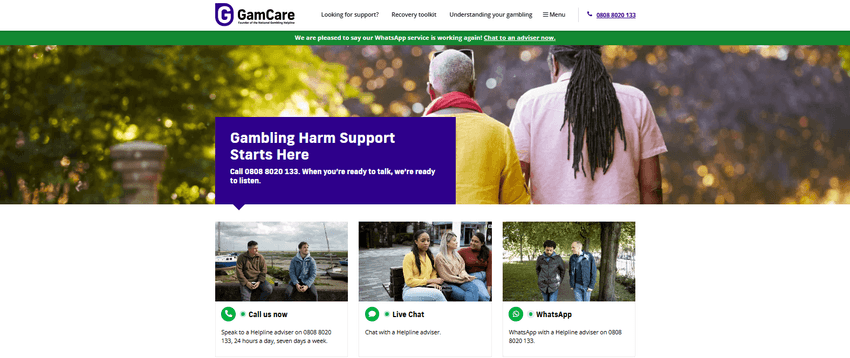
Contacts | Website: https://www.gamcare.org.uk/ WhatsApp: +44-808-8020133 Live chat |
|---|---|
Main functions | 24-hour telephone line • Online chat and forums • Lockdown programs • Group therapy |
GambleAware
This is a developmental resource with educational lectures and self-assessment tools. It helps gamers gain complete control over their behavior and identify issues early on.
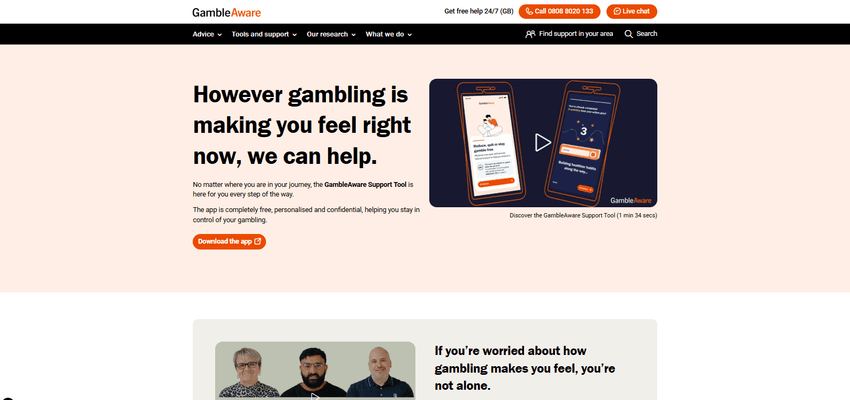
Contacts | Website: https://www.gambleaware.org/ Phone: +44-808-8020133 |
|---|---|
Main functions | 24-hour telephone line • Online chat and forums • Lockdown programs • Group therapy |
GamTalk
This service provides an innovative online support platform through group discussions. It creates a safe space for sharing experiences.
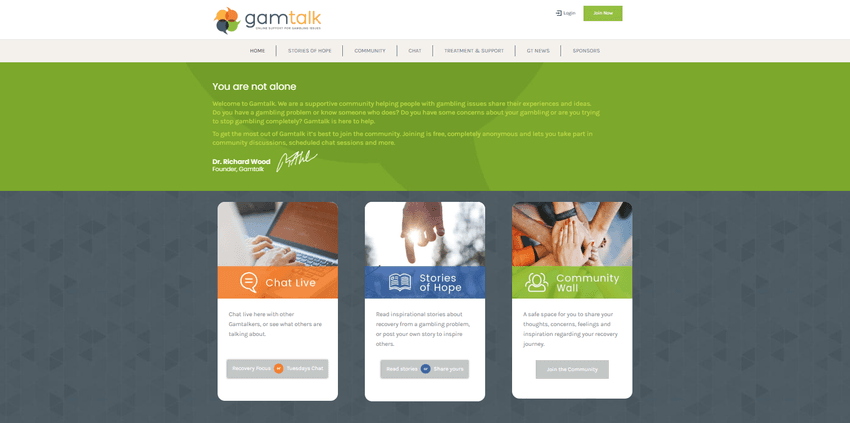
Contacts | Website: https://www.gamtalk.org/ Live chat: https://www.gamtalk.org/chat/ |
|---|---|
Main functions | Forums and group sessions • Complete anonymity • Podcasts and webinars • 24-hour support |
International Center for Responsible Gaming (ICRG)
This is a hub that takes a scientific approach to the prevention and treatment of gambling addiction. ICRG offers individual educational programs.
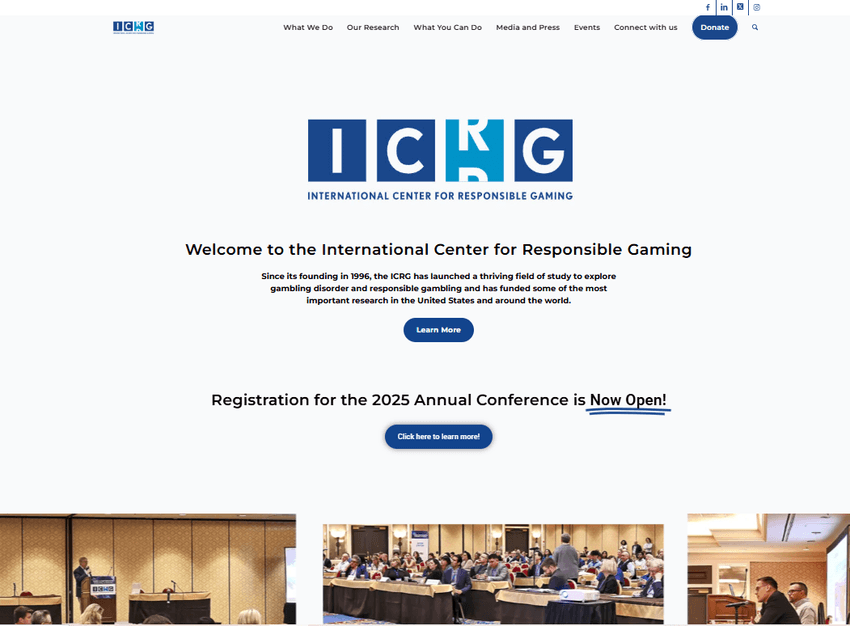
Contacts | Website: https://www.icrg.org/ Phone: + 1-978-338-6610 Email: [email protected] |
|---|---|
Main functions | Webinars for groups • Scientific articles • Thematic conferences |
Gam-Anon
This international body aims to provide comprehensive support to problem gamblers and their families. Gam-Anon follows a 12-step program for recovery.
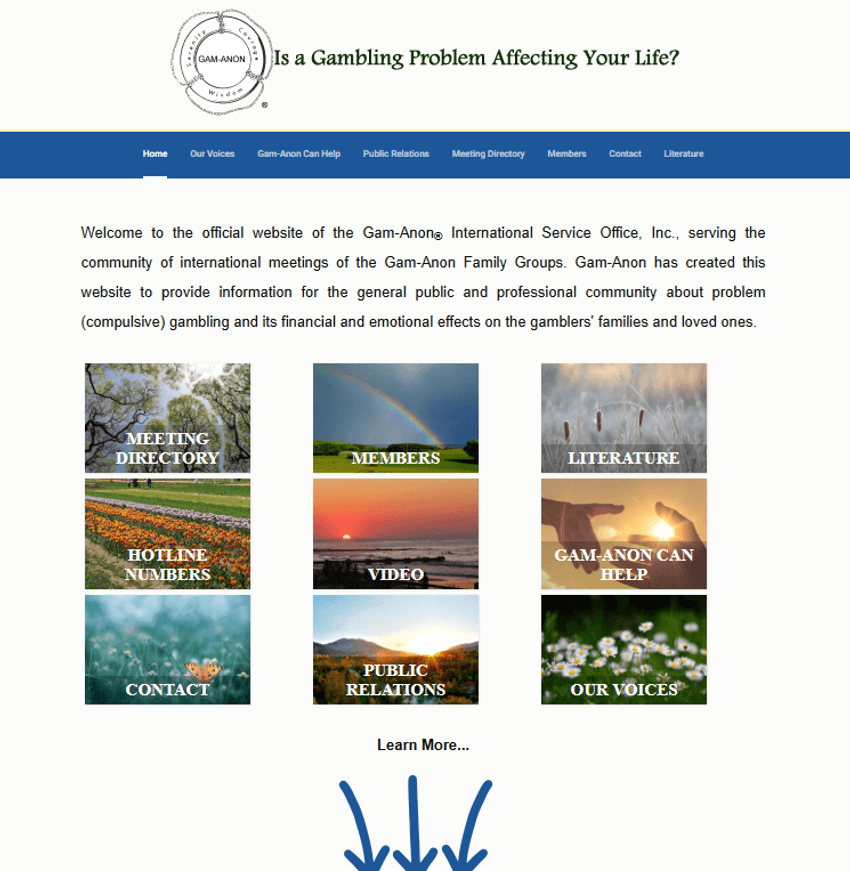
Contacts | Website: https://www.gam-anon.org/ Phone: +1-718-352-1671 Email: [email protected] |
|---|---|
Main functions | Group sessions • 12-step program • Educational method • Spiritual recovery • Working with a psychologist |
Gamblers Anonymous
Gamblers Anonymous is a global hub of mutual assistance to those suffering from gaming addiction with a proven recovery methodology.
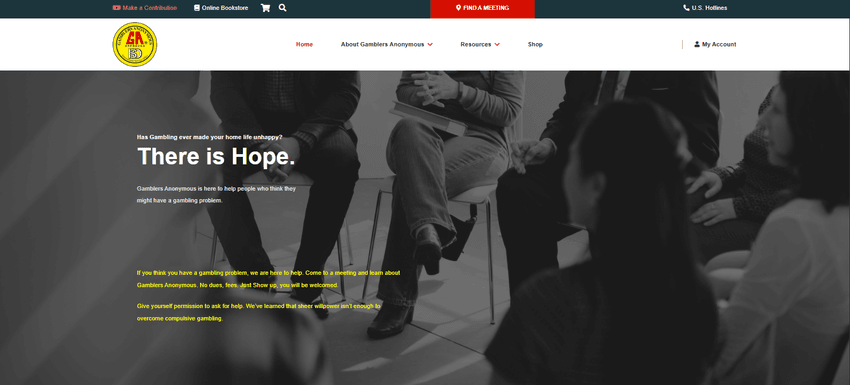
Contacts | Website: https://gamblersanonymous.org/ Phone: +1-909-931-9056 Email: [email protected] |
|---|---|
Main functions | Meetings of any format • 12 stages of treatment • Self-assessment questionnaire |
All these organizations have a unique set of services, techniques, and tools, allowing sufferers to choose the most suitable format. These responsible gambling resources don’t offer a set of prohibitions, but become personal planners, helping you preserve your time, money, and well-being.
Responsible Gambling Tools and Recommendations
When it comes to safe gambling practices, keeping things in check is key. You want to enjoy the thrill without letting it take over your life. So, let’s break down some responsible gambling tips and tools that’ll help you stay in control and keep the fun alive.
Tools for Responsible Gambling
Remember, a responsible gambling service helps you use these tools and resources to maintain control over your gambling habits and seek help if needed. If you or someone you know is struggling with problem gambling, don’t hesitate to reach out for support.
Aspect | Tools | Description |
|---|---|---|
Setting limits | Time Limits | Decide on a specific duration for your gambling sessions and stick to it. |
Deposit Limits | Set a maximum amount of money you’re willing to deposit into your gambling account within a certain timeframe. | |
Loss Limits | Determine the maximum amount of money you’re comfortable losing during a gambling session and stop once you reach that limit. | |
Wagering Limits | Set limits on the amount of money you’re willing to wager on individual bets or spins. | |
Self-exclusion programs | Voluntary Self-Exclusion | Choose to exclude yourself from gambling activities at specific casinos, online gambling sites, or other venues for a predetermined period. |
Budgeting and Financial Tools | Gambling Budgeting Tools | Utilize apps or spreadsheets to track your gambling expenses and ensure they remain within your budget |
Financial Management Resources | Seek counseling or assistance if you’re experiencing financial difficulties due to gambling. | |
Information and support | Responsible gambling hotline | Access confidential support and guidance from trained professionals who specialize in gambling addiction. |
Online Forums and Support Groups | Connect with others who are experiencing similar challenges and share experiences and advice. A similar approach is manifested by GamCare. | |
Educational Resources | Learn more about responsible gambling practices, warning signs of problem gambling, and available support services by type. Bodies include ResponsiblePlay and the American Gambling Association. | |
Therapeutic Interventions | Cognitive-Behavioral Therapy (CBT) | Participate in sessions with a trained therapist to address underlying issues and develop coping strategies for managing gambling urges. |
Supportive Counseling | Engage in individual or group counseling sessions to explore the emotional and psychological aspects of gambling addiction. | |
Reality Check | Set up reminders or notifications during your gambling sessions to prompt you to take breaks and assess your gambling behavior. | |
Blocking Software | Install software or apps on your devices that block access to gambling websites and apps, helping you resist the temptation to gamble online. | |
Parental Controls | Use parental control features on devices and internet browsers to restrict access to gambling content for underage individuals or those at risk of developing gambling problems. | |
In-Game Tools | Gambling Limit Features: Some online gambling platforms offer in-game features that allow you to set limits on your gambling activity directly within the game interface. | |
Peer Support Groups | Join peer-led support groups where individuals with gambling problems share experiences, offer mutual support, and encourage each other in their recovery journeys | |
Here’s some positive news from earlier this year. On February 18, the Association for Responsible Online Gaming (ROGA), together with EPIC Global Solutions, Kindbridge Behavioral Health, and the Responsible Gambling Council (RGC), launched a topical project for students called Know Your Game. The idea went beyond the usual seminars. Instead, through live and authentic discussions with a focus on mental well-being, financial literacy, and the practical habits of responsible gambling, trust can be built, and participants can properly understand the risks.
Recommendations and Tips for Responsible Gambling
By implementing these responsible gambling guidelines and utilizing the available resources, you can stay ahead of the game and ensure that gaming remains a fun and responsible pastime.
1. Practice Self-Care
Prioritize self-care and healthy coping mechanisms to maintain overall well-being. Engage in activities that bring you joy and fulfillment outside of gambling, such as:
- hobbies,
- exercise, or
- spending time with loved ones.
This balance helps reduce reliance on gambling as a sole source of entertainment or stress relief.
2. Set Limits
Establish clear limits on both the time and money you spend on gambling. This helps you avoid excessive losses and ensures that gambling remains an enjoyable activity rather than a financial burden.
3. Track Your Spending
Keep tabs on your gambling expenses by regularly monitoring your spending. This awareness can help you stay accountable and avoid exceeding your predetermined budget.
4. Watch Out for Warning Signs
It’s crucial to watch out for red flags that may indicate your gambling habits are becoming problematic. If you find yourself constantly thinking about gambling, lying about your activities, or neglecting other responsibilities, it may be time to reassess your habits. Don’t put off seeking help if you notice these warning signs. This practice is the core of the responsible gambling policy.
5. Take Breaks
Incorporate regular breaks into your gambling sessions to maintain perspective and prevent burnout. Stepping away from the activity allows you to reassess your decisions and avoid impulsive behavior.
6. Use Self-Exclusion Tools
Take advantage of the self-exclusion programs offered by casinos and online gambling platforms. These tools allow you to voluntarily ban yourself from gambling for a specified period, providing a valuable barrier against compulsive behavior.
7. Seek Support
Don’t hesitate to reach out for help if you feel your gambling habits are getting out of control. Counseling services, support groups, and helplines are available to provide guidance and assistance in managing gambling-related issues.
8. Stay Informed
Responsible gambling advice always includes contacting specialists (such as psychologists or financial consultants) or support groups. Educate yourself about the risks and signs of problem gambling. By staying informed, you can recognize potential red flags early on and take proactive steps to address them.
Remember, Responsible Gambling Is Within Reach
Maintaining control over your gambling habits doesn’t mean giving up the excitement altogether. It’s about finding the balance that allows you to enjoy the experience without letting it take over your life.
Resources and Support
Navigating the complexities of responsible gambling often requires a support network and access to valuable resources. Whether seeking assistance for oneself or a loved one, understanding where to turn for help is paramount.
In the following tables, we present a comprehensive compilation of responsible gambling organizations in the USA across various states, connecting individuals with companies, helplines, and counseling services dedicated to promoting responsible practices and providing support for those in need.
Take a step toward a healthier relationship with gambling by exploring the wealth of resources available in your area. If you feel you are losing control and are betting more than you can afford, contact your responsible online gambling team.
Responsible Gambling Organizations in the USA
State | Website/Organization | Contact Methods |
|---|---|---|
District of Columbia, Georgia, Hawaii, Iowa, Mississippi, Missouri, Montana, Nevada, New Hampshire, Nebraska, New Jersey, North Carolina, North Dakota, Ohio, Oregon, Rhode Island, South Carolina, South Dakota, Tennessee, Texas, Utah, Vermont, Virginia, Washington, West Virginia, Wisconsin, Wyoming |
| |
| ||
Florida |
| |
| ||
Idaho |
| |
Illinois |
| |
Indiana |
| |
| ||
Kansas |
| |
Kentucky |
| |
Louisiana |
| |
| ||
Maine |
| |
Maryland | ||
| ||
Massachusetts |
| |
| ||
Michigan |
| |
| ||
Minnesota |
| |
New Mexico |
| |
| ||
New York |
| |
| ||
Oklahoma |
| |
Pennsylvania |
|
Education and Awareness
The essence of responsible online gambling is incredibly simple: to allow you to maintain control. Gaming addiction is not a myth, but a silent epidemic that hits wallets and families. The numbers that researchers around the world collect make you shudder. According to QuitGamble, 1.2% to 6% of people in different parts of the world are trapped, and in some countries (such as Latvia and China), this problem has reached truly alarming proportions.
And what’s going on with responsible gambling in the USA? The picture here is also concerning. One in 20 people in Oklahoma can’t handle their craving.
But there is good news. The first step to a solution is understanding the problem itself. This is where the responsible gambling definition comes to the rescue: it is not about prohibitions, but about conscious control.
By introducing understandable responsible gambling strategies, such as limits, timers, and transparency, you do not deprive yourself of pleasure. You merely put a fence around the cliff. And if you feel that you are about to fall, responsible gambling help resources are available 24/7 to support you.
Prevalence Stats
Approximately 1% of the American population is estimated to be affected by a gambling disorder, with individuals unable to stop despite the adverse consequences.
It is reported that a higher percentage of youths, ranging from 2% to 7%, experience gambling disorders compared to approximately 1% of adults in general, indicating an early onset of these issues.
Research suggests that an estimated 17% of college students gamble at higher rates than the general population, playing a role in the prevalence of gambling disorders.
Risk Factors
Gender disparity is noted, with men historically displaying a higher likelihood of experiencing gambling problems. However, the gap has reportedly narrowed in recent years, pointing to shifting trends in behavior. Today, women are actively catching up with men in the race for dubious winnings.
These days, almost 50% of casino games are played online, over 50% of bets are electronic, and up to 41% of lottery tickets are bought via the internet.
Family history and genetic factors are substantial risk factors, with individuals who have a parent with a gambling problem being predisposed to developing similar issues.
Co-occurring disorders are prevalent, with individuals suffering from gambling disorders often experiencing mood or personality disorders, such as schizophrenia, antisocial personality disorder, or attention deficit hyperactivity disorder (ADHD).
Policies and Initiatives
In the realm of services for responsible gambling online, policies and initiatives play a crucial role in shaping industry standards and promoting responsible practices.
Consider the key aspects related to legislation, industry standards, and initiatives aimed at fostering responsible gambling.
Gambling Legislation
Gambling legislation varies by jurisdiction, with different laws governing aspects such as licensing, taxation, and consumer protection.
Each state in the USA has its own set of regulations for gambling activities, including:
- casinos,
- online betting, and
- lotteries.
Both operators and players need to be aware of the legal framework in their respective regions to ensure compliance.
Industry Standards
The gambling industry adheres to a set of standards and guidelines aimed at promoting fairness, transparency, and responsible gaming.
Regulatory bodies, such as gaming commissions and authorities, oversee the sector to ensure compliance with these standards.
This includes measures to:
- prevent underage gambling,
- combat problem gambling, and
- ensure the integrity of games and outcomes.
Responsible Gambling Programs
Many gambling operators and organizations implement responsible gambling programs aimed at promoting safer gaming environments and supporting individuals affected by gambling-related harm.
These programs often include measures such as:
- self-exclusion options,
- responsible gaming tools (e.g., setting deposit limits and reality checks), and
- educational resources to raise awareness about problem gambling and available support services.
Self-Regulation Initiatives
In addition to regulatory oversight, the gambling industry engages in self-regulation initiatives to promote responsible gaming practices.
These may involve collaboration between operators, industry associations, and advocacy groups to develop best practices, share resources, and implement measures to minimize the risks associated with gambling.
Public Awareness Campaigns
Governments, non-profit organizations, and industry stakeholders often collaborate to educate the public about responsible gambling and raise awareness of available support services. These campaigns may include:
- advertising,
- community outreach programs, and
- online resources to reach individuals at risk of developing gambling-related problems.
Research and Data Analysis
Ongoing research and data analysis play a vital role in informing gambling policies and initiatives. Studies on gambling behavior, prevalence rates of problem gambling, and the effectiveness of interventions help policymakers and stakeholders make evidence-based decisions to address gambling-related harm and promote responsible gaming practices.
Continuous Improvement Efforts
The gambling industry is continually evolving, and efforts to promote responsible gambling must adapt to changing trends and technologies.
These include ongoing evaluation of existing policies and initiatives, collaboration with stakeholders, and innovation in prevention and treatment strategies to ensure that efforts to address problem gambling remain effective and relevant.
By implementing robust policies, the gambling industry can work toward creating a safer and more responsible gaming environment that prioritizes consumer protection and well-being.
